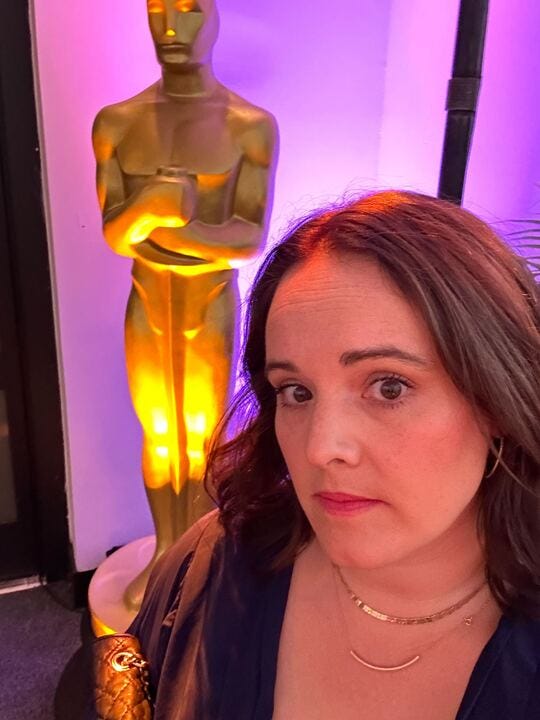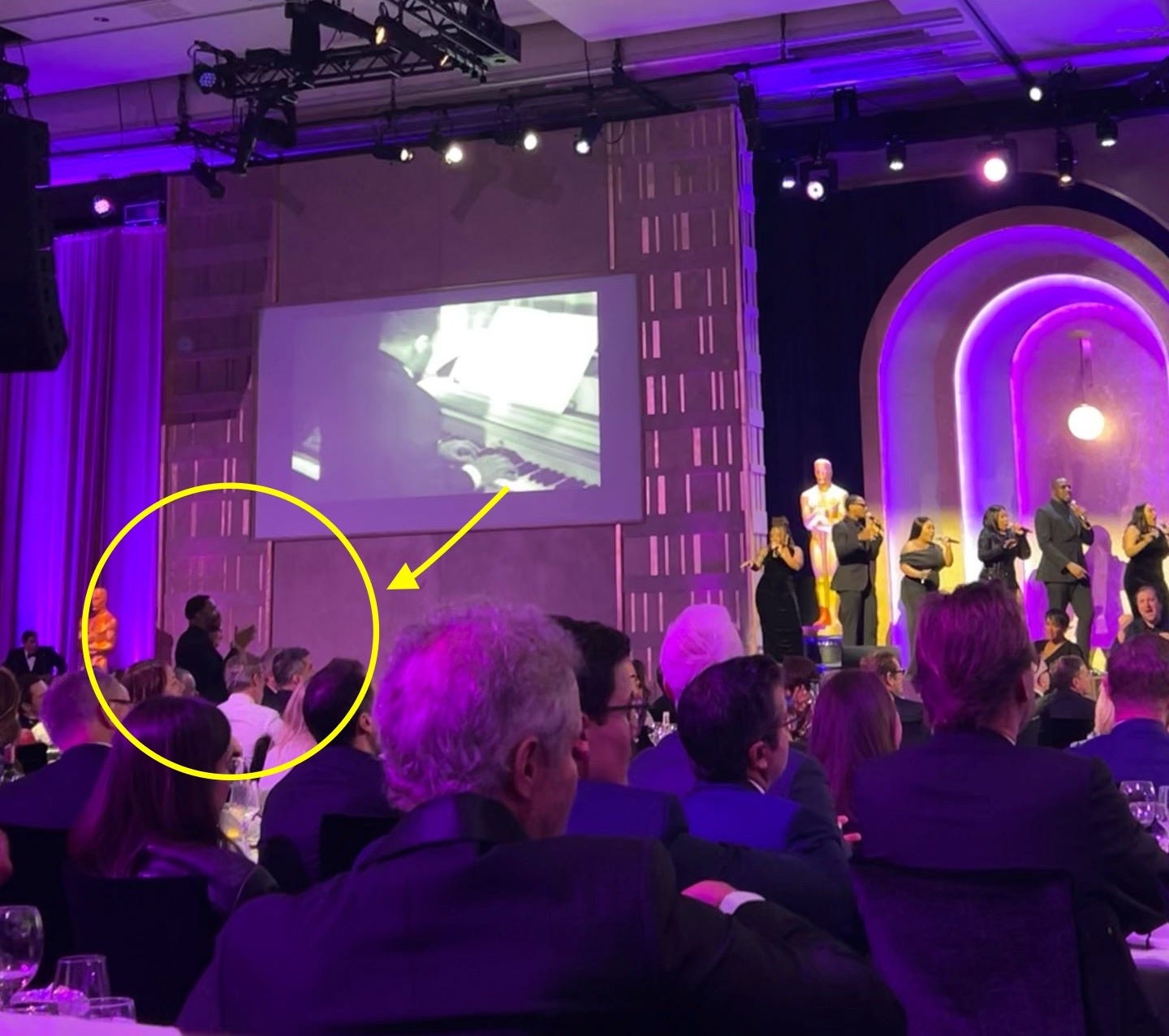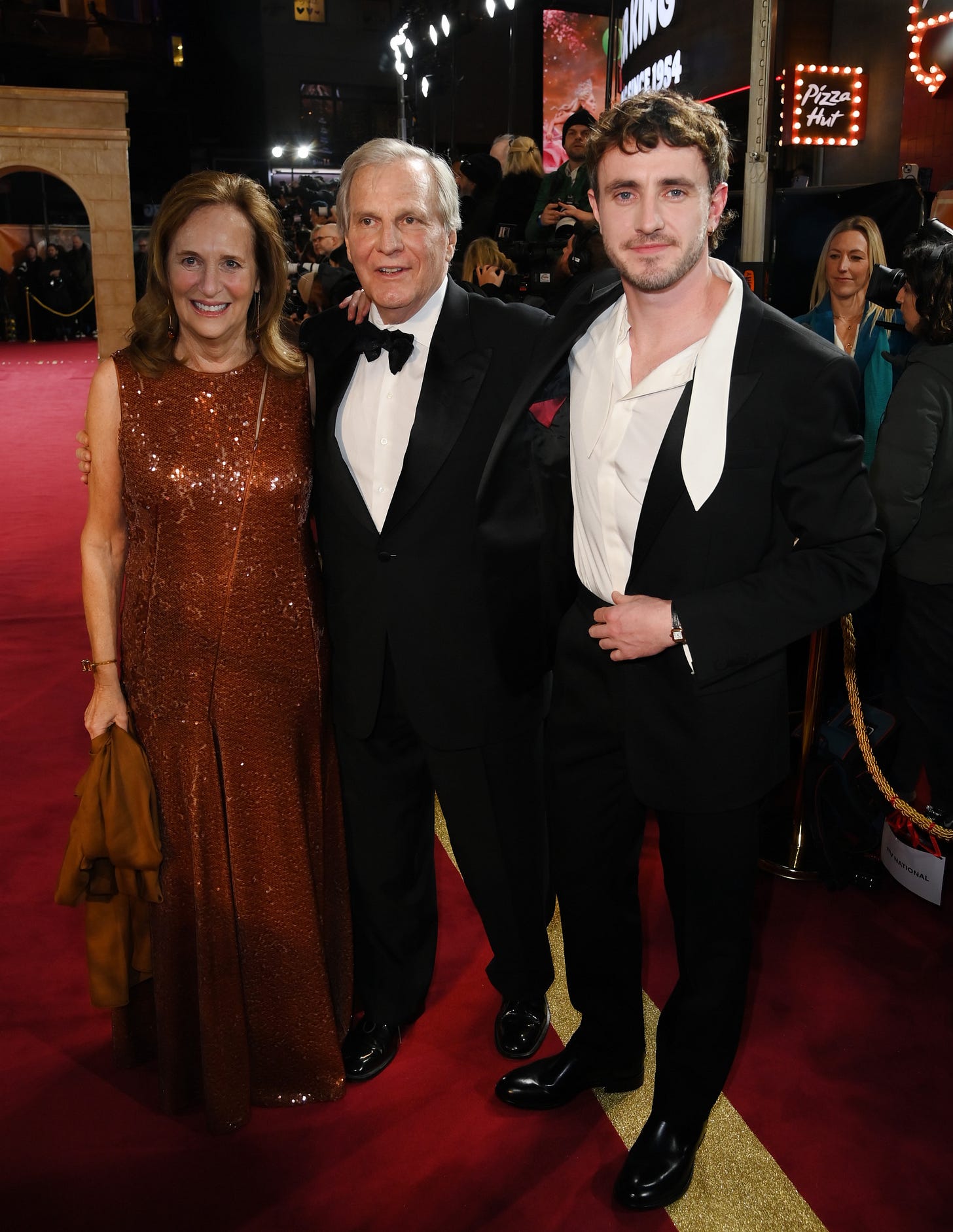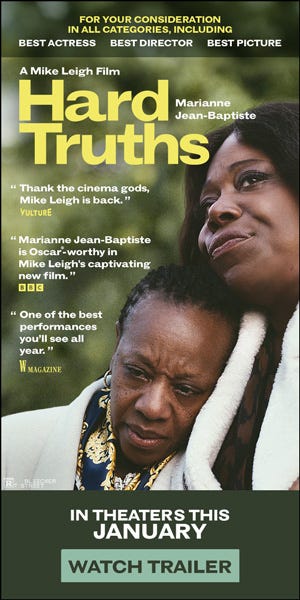My Night at the Governors Awards
Also: I talk to producers Lucy Fisher and Douglas Wick about their perilous journey with Ridley Scott's epic 'Gladiator II'

At a Hollywood party it is generally pretty easy to spot the famous people in the room: The whole energy of the place gravitates toward them. The one exception, it turns out, might be the Academy’s annual Governors Awards, a room so star-studded that there is no center of gravity — and the stars are as excited to see each other as anyone.
In the mingling hours at the event, held Sunday night at Los Angeles’ Dolby Ballroom, I too was a guest, and tried to take in as much as I could. Two of this year’s breakout young stars — Gladiator II and Thelma’s Fred Hechinger and I Saw the TV Glow’s Justice Smith — were deep in conversation not far from where September 5 star Peter Sarsgaard was telling Anora director Sean Baker about a past film shoot gone awry. J.J. Abrams had a huge hug ready for his former Super 8 star Elle Fanning, now in the upcoming A Complete Unknown. Yura Borisov and Mark Eydelshteyn, the breakout Russian stars of Anora, were hustling over to be introduced to Bond producers and honorees Barbara Broccoli and Michael G. Wilson.
If the stars are ever truly like us, it might be in this room. Daniel Craig, starring in Queer and also on hand to present the honorary Oscars to his Bond producers Broccoli and Wilson, was waiting in line for the bar next to me, and I can report that he tipped well (I’m pretty sure I spotted a $10). A man gently put his hand on a friend’s shoulder to squeeze by between tables and was gone before anyone clocked it was A Different Man and The Apprentice star Sebastian Stan. Conclave director Edward Berger told me his main concern was making sure he got dinner. (He did; unlike the Oscars themselves, the Governors Awards serve a meal — in this case, short ribs and a plate of excellent cookies.)
First held in 2009, the Governors Awards present the honorary Oscars once included in the main awards telecast. Though punting the awards to their own separate, un-televised night may have begun as one of the Oscars’ endless efforts to boost telecast ratings, it’s evolved into a true spectacle unto itself — and a key Oscar campaign stop for nearly every film in the race. In a room absolutely jammed with Oscar voters — even publicists can’t attend with their clients if they’re not already in the Academy — everyone with a film in the race is eager for a seat at the table.
After the schmoozing hour ended, the contenders sat down and paid tribute with everyone else. Colman Domingo, a best actor hopeful for Sing Sing, opened the evening with a brief testimonial for all of the honorees, and a solid running joke about leaving his headshot at the door for each of them. Craig landed his own good joke about the next Bond when introducing Broccoli and Wilson, acknowledging that the whole world wants to know who it will be — “and he might be in this room. Just kidding.” (The hopes he dashed!)

Nicole Kidman, meanwhile, delighted the crowd when she stepped up to present the Oscar to casting director Juliet Taylor, found a microphone that was too short — and simply removed her shoes to make it work.
Operating on a different level entirely, though, was Hugh Grant. As I learned during our live onstage conversation in Toronto, he knows how to work a room, but given the job of presenting his Love Actually and Notting Hill director Richard Curtis with the Jean Hersholt Humanitarian Award, Grant delivered an expert roast that still had Curtis visibly moved by the end, even after he’d called him “this asshole” with a “repulsively successful career.” (As is often the case with Grant, his best jokes were aimed at himself; a nod to a career lull due to “some flop or some arrest or whatever” got a huge laugh from Kate Winslet at the table next to mine.)
The clear emotional climax of the evening, of course, came with the final tribute to Quincy Jones, who had been preparing his acceptance speech for his honorary Oscar before he died earlier this month at the age of 91. Jamie Foxx took the stage to introduce a video tribute to Jones’ work, which was followed by a performance from Jennifer Hudson and then a speech from four of his children, led by Rashida Jones.
“That was his real legacy: love,” Jones said near the end of her speech. “He often said, ‘Live each day like it’s your last, and one day you’ll be right.’ And you did, Dad. You lived the biggest, best, most beautiful life of love, every single day you were here. So in honor of our Dad, we hope you will do the same.”
Throughout the evening, from the introductory speech from Academy president Janet Yang to Curtis’ acknowledgment of the challenging past two weeks for many, there were small gestures toward the election results — and the sense that demanding times for artists lay ahead. But there were no calls to action against the upcoming Trump administration, no fiery speeches about justice like Meryl Streep’s remarks at the Golden Globes in 2017. When Foxx did a bit of his eerily accurate Trump impression, it earned laughs, but also the sense that Trump had crashed a party to which he was not invited.
In early 2017, Trump’s election was the subtext behind every single awards show, an upending force that may well have determined the best picture winner. This time, it now seems clear, will be different. By the time the Oscars happen, Trump will, in fact, be back in office, so everything may be different then. But for now the Hollywood resistance, whatever that turns out to be, will be staying away from awards show stages.
An Interview with Producers Lucy Fisher & Doug Wick

On my way to the Governors Awards last night, I had what felt like a quintessentially Hollywood experience: hoofing it down Hollywood Boulevard because the street was closed. Right down the block at the Chinese Theatre, preparations were underway for tonight’s L.A. premiere of Gladiator II. Fake Roman columns had been assembled, the red carpet was rolled up nearby, and by the time you read this, the spectacle may have already begun.

Much of the Gladiator II team was there at the Governors Awards as well, including star Paul Mescal, director Ridley Scott and producers Douglas Wick and Lucy Fisher. A few weeks ago I caught up with Wick and Fisher on Zoom to look back on the wild ride of making the sequel to the best picture winner. Here are details of my conversation:
‘We Had to Start Without a Finished Script’
Lucy Fisher watched the sun set on the Roman empire. No, literally.
When the SAG strike shut down productions around the world last summer, the set of Gladiator II on the island of Malta might have been the largest to go silent. “We built a Rome and it suddenly was empty,” recalls Fisher, one of the film’s producers alongside her husband and Red Wagon Entertainment co-chair Douglas Wick. “When the last drop of sunshine went away, you thought, this is what it might've felt like in Rome as it just disappeared.”
For Fisher, it was her first visit to the Roman Empire — when Gladiator was released in 2000 she was vice chairman at Sony. She joined Red Wagon after Wick took home the film’s best picture Oscar the next year. Speculation about a Gladiator sequel had already started by then, but it took nearly 25 years — and a whole lot of producing muscle from Wick and Fisher — for it to come to life.
By the time the strike shut down production for four months, Wick and Fisher had already gambled on brand-new star Paul Mescal as their lead, persuaded Pedro Pascal and Denzel Washington to take on roles much smaller than what they might usually be offered — and secured enough tents and trailers to turn a Moroccan desert into a proper Hollywood backlot. But they still hadn’t figured out one pretty essential thing: How the movie would end.
“We had to start without a finished script, which was very, very problematic,” says Fisher with a hint of understatement.
“Your first goal is survival,” adds Wick, sounding as much like a gladiator in the arena as a seasoned producer. “Part of producing is that in the onslaught of calamities not to lose sight of your North Star. The thing that happens often is you get all the problems, and suddenly the storytelling gets kind of pushed to the side.”
David Scarpa’s script was complete enough by the time the WGA strike started in May that Gladiator II could get underway, tackling massive action scenes as well as some of the battles inside their recreated version of the Colosseum. It was some connective tissue that had yet to be settled, particularly around the emotional journey for Mescal’s lead character Lucius — including what Lucius would decide to do once the film’s climactic battle was finished.
When the strike began, the first order of business was entirely practical: Wick and Fisher had to book flights for everybody, find a place to store the sets, and even make a plan to keep the ancient Roman sets appropriately weathered.
After that, it was time to take a closer look at what they had.
Seeing an edit of what they’d already shot, Wick says, was “this rare, incredibly valuable opportunity to see a little bit of what’s working and what’s not. I would say it ended up being very good for the movie, which is what your kind of goal is: to take adversity and turn it into opportunity.”
“Except for the extra money,” adds Fisher, “which was not insubstantial.”
Pushing Through a ‘Scary As Hell’ Business
The SAG strike ended on Nov. 9, and production geared back up just in time for director Ridley Scott to celebrate his 86th birthday on set. “We’ve talked to a lot of friends who say, how did Ridley find the Fountain of Youth?” Wick says. At the birthday dinner, Wick teased Scott for “both being fierce and yet secretly being so loyal that every department head was the same one I was there with 25 years ago.”
Fisher says being on a movie set is for Scott what eating spinach is for Popeye. Wick remembers Scott shooting some of the film’s most expressionistic scenes and beckoning the producer over, giddy with excitement at what he’d captured. Fisher made it her goal to get Scott to accept a simple compliment at some point during production, and it’s unclear if she ever succeeded. “I would run up sometimes to him after something and say, that was fantastic!” she remembers. “And he would reply exasperated, like, Well, what did you expect?”
Gladiator II is a proud throwback, not only reuniting so much of the team from the original film and casting one of the most enduring movie stars of the past 30 years in Washington, but also reviving the sword-and-sandals genre as old as Hollywood itself. But even the indefatigable Scott can’t actually defeat time. Gladiator II opens into a very different world than the original, released by a studio under upheaval and an industry still in a full-blown existential crisis.
Wick considers himself the optimist in his marriage but admits that the stakes have changed. “You used to be able to get lucky with a mediocre, big movie,” he says a bit wistfully. Today, he continues, “The sense is if you could make a good one with theatricality, with one of the great directors in the world . . . I feel very confident that the experience will be one that people will then tell their friends, you should have this experience on the big screen.”
Fisher is a lot more frank. “The business is scary as hell,” she admits. “One of the reasons why I think this movie was so profoundly fun for us is that we got to make maybe the last set that will be built this big.”
But both are keeping the faith, in the end, that there’s an audience out there for a gigantic spectacle — or maybe even two of them, with Gladiator II opening opposite Wicked this weekend. After all, when Fisher was at Sony in the '90s, it was practically unheard of for a big movie to open without healthy competition.
“What we need more is more good movies, so that people want to say, ‘I’m going to go to the movies this weekend,’’ says Fisher, “and there’ll be more for them to choose from.”
Sounds simple, right? It’s a concept as straightforward and nearly as old as a gladiator match. Now it’s time to see if Hollywood can actually remember how to make it work.






This was a great read! I enjoyed the producer's experience and shared insights.